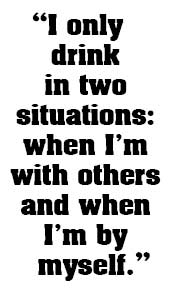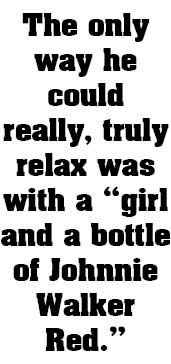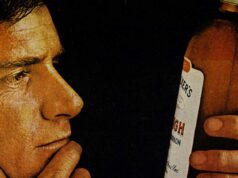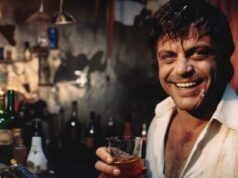“We were supposed to drink. We were following the heritage of the pro athlete going back to Babe Ruth. You punished your body. It was so ingrained: you played ball until you couldn’t play anymore. After that, you hit the bar.”
—Larry Grantham, linebacker, NY Jets
The late 1960s saw the rise of the superstar athlete, those colorful characters who popped up in gossip columns as much as they did on sports pages.
And few caused a bigger stir or excited more heated debate than New York Jets quarterback Joe Namath.
Joe reinvented himself over and over again. Ad agencies sought his services as a pitchman, and he appeared in dozens of commercials, including the infamous spot for Beautymist, which featured Joe in panty hose. He dated movie stars and rock singers. He starred in movies and Broadway shows. He had his own daytime talk show. And he did it all with a drink in his hand.
It wasn’t just a nickname. He was Broadway Joe.
In a sport that has produced a plethora of epic boozehounds, Joe Namath belongs right at the top of the list. Morning, noon or night, you’d find him with a glass of vodka, Crown on the rocks, or a bottle of beer in his hand. The hand not encumbered with booze was usually filled with an attractive young lady. In Joe’s life, the party ran 24/7.
The favorite son of Beaver Falls, Pennsylvania, grew up a multi-sport athlete, setting high school records in football, baseball and basketball. Before he even graduated, the Chicago Cubs and Baltimore Orioles offered big money for his services as a pitcher, but Joe wanted to play football.
The Meteoric Rise
In 1965 the New York Jets were a struggling young team in the upstart AFL. They were looking for just the right player, someone who could really make a splash, and they set their sights on a cocky, strangely dressed, good-looking quarterback from the University of Alabama. Namath packed his bags and headed for the Big Apple, where his idiosyncratic wardrobe (he once walked the sidelines in a $5,000 tailored mink coat), long hair, goatee and party animal habits lit fires all over the city.
 Namath played well for the Jets. He had a bazooka for an arm (before becoming “Broadway Joe” he was “The Hungarian Howitzer”), which enabled him to invent new plays, such as sending his receivers on deep crossing routes and hitting them in stride, something most pro quarterbacks lacked the arm strength to do. He was the first QB in any league to throw for more than 4,000 yards in a single season. He was voted AFL Rookie of the Year and was the AFL All Star game MVP in 1966. In 1969 he was voted the overall AFL MVP. Contrary to his image, Joe Namath was a tough son of a bitch. Friends and foes alike respected Joe’s ability to take brutal hits and come back for more.
Namath played well for the Jets. He had a bazooka for an arm (before becoming “Broadway Joe” he was “The Hungarian Howitzer”), which enabled him to invent new plays, such as sending his receivers on deep crossing routes and hitting them in stride, something most pro quarterbacks lacked the arm strength to do. He was the first QB in any league to throw for more than 4,000 yards in a single season. He was voted AFL Rookie of the Year and was the AFL All Star game MVP in 1966. In 1969 he was voted the overall AFL MVP. Contrary to his image, Joe Namath was a tough son of a bitch. Friends and foes alike respected Joe’s ability to take brutal hits and come back for more.
The apex of Namath’s career was his eye-popping performance in the Jets’ January 1969 win over the Baltimore Colts in the World Championship Game (now known as Super Bowl III). Namath faced an uphill battle. Sportscasters called the Colts “the greatest football team in history,” and the Jets were 18-point underdogs. This was the final Championship Game before the NFL and AFL merger, and the AFL had not fared well in their previous showdowns with the older NFL, going down in blowouts two years in a row. This game would, according to the naysayers, prove once and for all that the proposed merger should be consigned forever to the history of bad ideas. Celebrated former player Norm Van Brocklin singled Joe out for special abuse, saying, “This will be Namath’s first professional football game.” Yeah, the yucks just kept right on coming.
A few days before the game, a guest at an awards dinner began shouting insults at Namath, suggesting that he and his team were a bunch of losers. Unruffled, Namath took a long pull from his glass of Crown and said, “The Jets will win. I guarantee it.” His “guarantee” would become the stuff of sports legend, but Namath was only getting started. For days leading up to the game, stationed on his customary pool-side lounge chair with a glass of iced vodka in his hand, he talked a never-ending stream of smack aimed at the Colts. They were old. They were slow. They were old-fashioned. His back-up QB, Babe Parilli was better than their starter, Earl Morrall (this in itself was a veiled shot at the Colts’ injured starter Johnny Unitas). Joe delivered these predictions and insults in his lazy drawl while flashing his million-dollar grin, and he drove the Colts batshit. They didn’t know whether to laugh with Namath or mob-up, find him, and beat him so badly his name fell out of the phone book.
Popular legend has it that Namath’s guarantee aroused headlines across the country, on a par with Babe Ruth’s “called shot” in the 1932 World Series, but that isn’t really the case. There was so much about Joe that was bigger than life that his guarantee was seen as just another outburst from his oversized ego. Headlines the morning after the game, however, solidified the legend. The lowly Jets, from the hayseed American Football League, had decisively beaten the unbeatable Colts 16 to 7. Front pages nationwide trumpeted the news, “Joe Guaranteed It!” Footage of the victorious quarterback jogging off the field at the end of the game waving a we’re-number-one finger in the air would become one of football’s iconic images.
The remainder of Namath’s football career would never again reach such lofty heights. He was beset with injuries, particularly his knees (both would be replaced with artificial ones in the 1980s), and he finished his NFL career warming a bench for the Los Angeles Rams. He retired in 1977.
However, the phenomenon sportswriter Marc Kriegel so aptly dubbed The Joe Namath Show just kept rolling along.
Boozing, Broadway Joe Style
Namath learned to drink as a youngster, back home in Beaver Falls. You could say he developed a taste for hooch as an infant— when he got fussy while teething his mother rubbed his gums with a rag soaked in grain alcohol. His family made wine at home and everyone got a glass (or three) at meal time. Always in need of cash, Joe hustled pool for beers at a local dive called the Blue Room. At the height of the college-recruitment frenzy, he often arranged meetings there. One recruiter, from Michigan, who arrived to find Joe loaded up on beer and snoozing in the afternoon sun on the hood of his car, left without a word, figuring the kid would be too much to handle. He might’ve been right. In the early 1960s, colleges weren’t yet accustomed to guys like Joe. That didn’t stop Bear Bryant, though. Bryant was a hard taskmaster and while Namath was an iconoclast, Bryant figured he could control the kid, and was about as successful at it as anyone could’ve been.
Drinking was against team (and university) rules, and Namath, despite numerous infractions, only got busted once, and on that occasion he was entirely innocent. Joe and his pal Hoot Owl (I am not kidding) were pulled over by a pair of bumpkin deputies who frisked the pair and carted them off to university authorities. Coach Bryant called the team together, summoned Joe to the front and demanded answers. Joe declared his innocence, saying he’d had no more than half a beer, but Bryant sided with the cops and suspended Joe for the last game of the season. The suspension rippled through Tuscaloosa; the town’s teetotaling Baptists were positively giddy about it. They never really cottoned to the smart-ass Yankee in the first place, what with his long hair and garish shirts and known association with blacks.
There is no evidence to suggest that Joe’s suspension “reformed” him in any way. He didn’t appreciate people telling him what to do with his free time, not even men like Bear Bryant, whom Joe called one of the finest men he ever met. No, Joe kept right on drinking and, in that regard, things got much easier for him when he left Alabama for New York.
Upon arriving in the Big City, Joe set himself up in a penthouse apartment and opened his now-stuffed wallet to decorators. Under his command, they created the quintessential 1960s bachelor pad: llama-skin rugs, satin sheets, silk wallpaper, marble floors, gold-plated bathroom fixtures, pillows covered in the skins of cheetahs and Siberian snow leopards, and mod furniture, including a long bar with stools enough to entertain plenty of visitors. Which he did. With vigor and until dawn.
Joe’s coming-out party with the New York sporting press was held at Toot Shor’s place, a former speakeasy and favorite watering hole among newsmen, as well as serious drinkers like Jackie Gleason and Frank Sinatra. The event turned into a five-hour booze-fest, with Joe openly and unabashedly draining bottles of beer. A reporter asked Joe about his drinking. Flashing his famous grin, Joe said he didn’t want folks to get the wrong idea about him because “I only drink in two situations: when I’m with others and when I’m by myself.” In an interview a few years later, another reporter asked Joe about his boozing. “I’m no hypocrite,” Joe said. “I don’t hide anything.” He paused to finish his drink before continuing. “I drink for the same reason I keep company with girls. It makes me feel good. It takes away the tension.”
The Pussycat
Joe quickly tired of hanging out at Toots Shor’s—there weren’t many girls there—but it didn’t take him long to settle on another suitable spot, The Pussycat on 49th Street and 2nd Avenue. It had everything Joe liked in a bar: good food, cheap, strong drinks, easygoing, companionable customers, and lots of pretty girls.
The Pussycat’s clientele ran the gamut from the famous to the infamous. Joe DiMaggio and Jack Lambert were regulars, as was Mickey Mantle. DiMaggio drank, but not with real gusto. Lambert and Mantle, however, were a whole different story. They frequently teamed up with Joe to form a drinking triumvirate of unsurpassed skill, agility and testicular fortitude. When they weren’t at the Pussycat, they could be found on one of several Westchester golf courses, or at celebrity tournaments around the country. The three star athletes traveled in one golf cart, and two more followed: one carrying the girls and the other carrying the liquor.
 For Joe, the Pussycat was his office, his second home. He was well liked there. In contrast to many celebrities, especially celebrity athletes, Joe tipped big and always picked up the check. He hardly ever got too rowdy and addressed the employees, from managers to busboys, as “sir” or “ma’am.” His momma raised him right. After a big win, Broadway Joe was likely to spring for a round for the house. His fans were welcome at the Pussycat. He chatted with them and signed all the autographs they wanted. He also put away, on average, around a bottle of Crown or Johnnie Walker at each sitting. He once said that the only way he could really, truly relax was with a “girl and a bottle of Johnnie Walker Red.”
For Joe, the Pussycat was his office, his second home. He was well liked there. In contrast to many celebrities, especially celebrity athletes, Joe tipped big and always picked up the check. He hardly ever got too rowdy and addressed the employees, from managers to busboys, as “sir” or “ma’am.” His momma raised him right. After a big win, Broadway Joe was likely to spring for a round for the house. His fans were welcome at the Pussycat. He chatted with them and signed all the autographs they wanted. He also put away, on average, around a bottle of Crown or Johnnie Walker at each sitting. He once said that the only way he could really, truly relax was with a “girl and a bottle of Johnnie Walker Red.”
Joe was known for his charm and his ability to drink with pretty much anybody. It didn’t matter if the guy on the next stool was a senator or a bricklayer; Joe could have a nice conversation. How you made your living was of no concern to him. If you treated Joe right, he treated you right. It was this very trait that got him close to another pair of Pussycat regulars: Carmine Tramunti and Tommy “Tea Balls” Mancuso, mob enforcers for the Colombo Family. His relationship with these men would eventually land Joe in a very ugly situation, the details of which we will get to shortly.
When the sun rose after a long night out, Joe enjoyed taking himself, his date and his friends out to breakfast. His favorite eatery was the Green Kitchen. Before considering food, however, Joe always placed his drink order: “A Miller, right away, no coffee.” A few beers and a big breakfast cleared his head, freshened him for whatever the day had in store; a commercial shoot, practice, or—if it was Sunday morning—a football game.
Game Time
Namath talked freely throughout his career about the curative properties of hard liquor. He had his knees drained nearly every day and suffered, over the years, an array of other painful injuries—dislocated fingers, torn hamstrings, wicked ankle sprains, bruised ribs and a broken jaw. Joe believed that booze was a better pain killer than any of the pills team doctors prescribed. He would sometimes take the pills, but preferred to come down after a game by sitting in a hot-tub with a bottle of whiskey.
Joe also believed that a good drunk kept him loose and ready to play. Former Colts lineman and record-setting party monster, Art Donovan, who worked for the Jets organization during Namath’s tenure, recalled that Joe would stagger into QB meetings “drunk off his ass the night before the game.” He never got busted for it, though. Other players might, but not Broadway Joe. The Jets were said to have two sets of team rules: one for Joe and one for everybody else.
Once, before a game against the Miami Dolphins, Joe arrived at the stadium less than an hour before kickoff. One look was all it took to see that he had been out all night. The team trainer offered him a shot of B12, but Joe refused. All he needed, he said, was something for his breath—a shot of peppermint schnapps in this case.
Namath wasn’t the only drinker on the team, not by a long shot. Many of his fellow players shared his habits, while at least one—running back John Riggins—took it to the next level. Riggins not only drank until the wee hours, but, rumor had it, once took to the field on game day while tripping on magic mushrooms. He would later get loaded at a hoity-toity Washington dinner and tell Supreme Court Justice Sandra Day O’Conner to “loosen up, Sandy baby!” It came to the point that an anonymous player suggested that the entire team should cease drinking for the four full days leading up to a big game against the Buffalo Bills. The Jets badly needed a win, so everyone agreed to the temporary prohibition. Oof. Bad idea.
Joe had one of his worst outings ever as a quarterback. He threw for four touchdowns, but also tossed five interceptions, two of which were returned for scores, had three balls batted down at the line of scrimmage, and was sacked five times. Talking to reporters after the debacle, Joe took full responsibility, as he always did, saying that all blame should be put on “this stupid guy right here.” A little while later he began drinking in earnest, later saying he “drank right on through the following Sunday when I threw no interceptions and we whipped San Diego.” Joe never again altered the way he prepared for a game.
Apart from Super Bowl III, the biggest game Joe ever played was the 1968 AFL championship game against the Jets’ hated rivals, the Oakland Raiders. At a little before eight that morning an off-duty New York cop witnessed something he would never forget. As he stood at a crosswalk waiting for the light to change, he glanced across the street and saw Joe Namath leaving the Summit Hotel. The quarterback had a girl on one arm and carried a whiskey bottle in his free hand. According to the cop, Joe looked tired and messy. He also appeared to still be drunk. Kickoff was at 1pm.
Oakland had been a rock in the Jets’ shoe for several seasons. No matter how they played or prepared, they just couldn’t beat the bastards. This time was different, however. The stakes were higher. A trip to this new thing called a Super Bowl was in the offing. Winning meant $15,000 bonuses and swaggering rights. The Raiders were arrogant, but the Jets were focused. Namath, grinning through his hangover, took charge of the game and executed one dazzling play after another, as the Jets stomped a mud hole in the Raiders and walked it dry.
Some years later Joe talked about his whereabouts the evening before the game. “I [had] the whole family in town and there’s people all over my apartment. I wanted to get away from everything. Too crowded, too much noise. So I went to Bachelors III [his bar; see below] and grabbed a girl and a bottle of Johnnie Walker Red and went to the Summit Hotel and stayed in the bed the whole night with the girl and the bottle.”
And that cop who saw Joe outside the Summit Hotel looking shabby and drunk? He raced to the closest sportsbook he could find and bet everything on the Raiders. It’s a hard way to learn a lesson, but he never should’ve doubted Broadway Joe.
Celebrity Status
After winning Super Bowl III, Joe was the guy everyone wanted to meet. He was invited to A-list parties and few celebrities passed through New York without pausing to pay him their respects. The same thing happened when he visited other cities for charity events or while on vacation. In Celebrity World, circa 1970, there were the Beatles, and there was Joe Willie Namath.
If there was one thing growing up in Pennsylvania and living in New York had taught Joe, it was that he hated cold weather. He spent as much off-season time as possible in Miami, where he had a house and was a fixture at Jilly Rizzo’s bar. He was there, a short time after Super Bowl III, when the bar’s other superstar regular popped by, specifically because he wanted to shake Joe’s hand. Joe, who according to witnesses was utterly shit-faced, was sitting with a couple of friends in a corner booth when the front door opened and a hush came over the room. A shadow fell over his table and Joe looked up into the smiling face of the Chairman of the Board himself, Frank Sinatra, flanked by a brace of mountainous body guards. Joe, who idolized the singer, leapt to his feet. In the process he knocked over the table and drenched Sinatra in cocktails. The hush in the room took on a sepulchral tone. Sinatra blotted his face and suit with a handkerchief while Joe slurred a stream of apologies. Bar staffers, who were very familiar with Sinatra’s volatile temper, waited for the explosion. Sinatra straightened his lapels, took Namath by the shoulders, and said: “Ah, hey, Joe. Don’t worry about it.” The two celebrities then sat together for a few drinks. Joe picked up the check.
Back in New York, Joe got a call from Janis Joplin’s manager. She was coming to New York and wanted to meet him. Joe liked her music and invited her to a party he was attending. As it turned out, Janis had rearranged her whole tour schedule to make this detour specifically to—well—jump Joe’s bones. She didn’t exactly fit Joe’s usual tastes, but Janis was not to be deterred, telling friends later that she and a bottle of tequila managed to change Joe’s mind. The next night she dedicated her concert to Joe Willie and the Jets.
Joe had charm to spare and Hollywood types were hot to sell it. They launched The Joe Namath Show, a day-time talk-fest modeled on those hosted by Mike Douglas and Merv Griffin. It was one of Joe’s few mistakes. He was uncomfortable on camera and his charm seemed forced. The show only lasted one season, but left its mark on those involved. The show’s producer, Larry Spangler, said “We were the drinkingest show in television. Joe’s coffee cup was filled with alcohol. Always.” The host was loaded, the guests were loaded, the crew was loaded. Apparently, if you listened closely when Joe sipped from his coffee mug, you could hear the ice cubes clinking in his whiskey.
As has been mentioned, Joe had a way with the ladies. He never had to go looking for them. Wherever he found himself, they just appeared—fainting, screaming, straining to touch his hair and grab at his clothing. After the Super Bowl win, he could barely move around on his own (it took a phalanx of 15 New York cops to transport Joe 40 feet from the dais to his car so he could participate in a parade thrown by the city to honor the Jets). To dodge his friskier female fans, Joe took to visiting different bars on different nights. One he liked was the Phone Booth, but word soon got around that he could be found there and the bar turned into a sea of girls with eyes for no one but Broadway Joe. Some literally spent hours at a time there, laying in wait, ready to pounce at the first sign of their beloved quarterback. On one of his last visits, he arrived late with a couple of friends, happy to find the place mostly empty. Of the girls present, a pair caught his eye but they were sitting with two men. Joe decided to take a shot anyway, and when one of the pair looked in his direction he turned on his high-voltage smile and gave her a nod. A moment later the girls had ditched their fellas and joined Joe and his pals for an all-night party at his penthouse.
The men they ditched were Keith Richards and Mick Jagger.
The Ridiculous Saga of Bachelors III
No discussion of Broadway Joe would be complete without touching on the aggravating and thoroughly bizarre story of his foray into private enterprise.
In 1969, Namath, along with two other investors, opened a night club on the East Side called Bachelors III (the name referred to the three principles, all of whom were single). Considering the amount of time Joe spent warming bar stools, opening a place of his own made perfect sense. The buzz around town was electric, and Bachelors III opened to rave reviews, turn-away crowds and colossal receipts. Plans were quickly implemented to open carbon copies in Florida and Boston.
Bachelors III became Joe’s sanctuary, a place where he was always welcome and at his ease. Then along came NFL Commissioner (and noted stick-in-the-mud) Pete Rozelle.
Hyper-concerned about the public image of League players, Rozelle got his jockeys all in a twist over the sorts of people who frequented Bachelors III, and thus came into regular contact with Joe Namath. Specifically, Rozelle fretted over the presence of three men: Carmine Tramunti, Tommy “Tea Balls” Mancuso (who had followed Joe from the Pussycat), and Carmine Persico (who, in a few short years, would rise to the role of Godfather of the Colombo Family). They were known mobsters, killers even, with FBI jackets thicker than Rosie O’Donnell’s ham-salad bill. To Rozelle’s knee-jerk way of thinking, it was a very short step from drinking with gangsters to being controlled by gangsters. He might’ve been right to worry about other guys, but not Joe Namath. Rozelle’s paranoia shows how ignorant he was about Namath’s character. The likelihood that Joe would have gambled on football or fallen under the sway of Mafia goons was about the same as the possibility of him moving to Mongolia and taking up sheep herding. In any event, Rozelle went after Joe, pointing out a section of the QB’s contract which stated that NFL players must never “enter drinking or gambling establishments” or “associate with notorious persons.” (Notorious persons? Hadn’t Rozelle ever met Al Davis?)
Commissioner Rozelle demanded that Namath sell his share of Bachelors III or be found in violation of his contract. Now, one of Namath’s most stubborn personality traits was his desire to keep his on-field and off-field lives totally separate from one another. He angrily wondered where Rozelle got off telling him what to do with his personal life. Privately, Joe told friends “Fuck him. I know I’m right.” Rozelle would not be swayed, and Joe refused to back down. Stalemate.
It was, anyway, until Joe called some members of the press together and announced his immediate retirement from professional football.
The announcement went off like a pipe bomb. What sort of maniac was this Namath guy? He’s gonna give up all that money and his place in the spotlight to run a bar? Has he taken one too many shots to the head? Did that cheap shot from Ben Davidson in ’67 really mush up his brains? And what the hell is up Pete Rozelle’s ass? He’s gonna let the Golden Calf take a long walk off a short pier? What is he, nuts?
Down at the NFL offices panic ensued. Joe Namath was the single most marketable player in the League, bar none. His presence on Sunday afternoons meant millions of dollars in television ad revenue. More than anyone, he was responsible for making the NFL/AFL merger a bankable reality. He’d been served to the League on a silver platter, but now it looked like they were intent on using the platter as a Frisbee. The situation had to be fixed, and fixed right damn quick.
Working through intermediaries, a meeting between Namath and Rozelle was arranged. It lasted well into the night, and in the end the antagonists reached a compromise. Namath would sell his share of the New York Bachelors III only. He would retain his shares of the Boston and Miami locations, as well as any that might open in the future. Joe wasn’t what you’d call happy, but since making his announcement he had realized how much money he was throwing away, so he signed off on the deal. After two weeks of retirement, Joe returned to the game he loved.
Things should have ended there, but they didn’t. The situation had gotten so big and loud that it attracted the attention of a pair of men who must’ve had better things to do than get involved in the affairs of a football player—FBI director (and mutant cross-dresser) J. Edgar Hoover, and the President of the United States himself, Richard Nixon. Hoover opened a dossier on Namath, apparently because Joe’s long hair was evidence of sedition of some sort. The dossier remained open until Hoover’s death in 1972, at which point it was closed and deposited in the circular file where it always belonged. As for Nixon, he was a Redskins fan, and in those days the Redskins sucked more ass than a porn star. Namath landed on Nixon’s infamous “enemies list” for the sole reason that he won football games.
The reality of Joe’s politics was this: he didn’t have any. He wanted to score touchdowns. He wanted money. He wanted girls. He wanted a bottle of Johnnie Walker Red. Everything else just got in the way.
Conclusion
Personally, I find the notion that a mega-star like Joe Namath would consider handing over the keys to the kingdom just to make a point about his personal integrity pretty inspiring—especially since the move in question involved owning a bar. Today, we hear all the time about pro athletes with wildly skewed priorities. What are the odds, do you think, that a player in today’s NFL would take the same stand Namath did? I wouldn’t bet that line.
Joe Namath wasn’t the greatest quarterback who ever played the game, not even in the top twenty, but he is easily one of the most influential. His victory in Super Bowl III is among the most important wins in the history of the sport. It lead directly to the creation of the NFL as we know it today. That alone makes him a hall-of-famer.
Not bad work for a cocky drunkard from Beaver Falls, PA.
(Note: the Author is indebted to the works of Mark Kriegel, Dick Schaap, Michael MacCambridge, and the Sports Illustrated on-line archives.)










